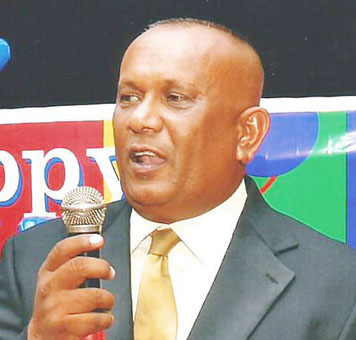There are signs that progress is being made towards the settlement of differences between the local Government Analyst Food and Drug Department (GAFDD) and its counterpart agency in Trinidad and Tobago, the Chemistry Food and Drugs Department, that could pave the way for a resumption of the importation into the twin-island Republic of packaged coconut water from Guyana.
Stabroek Business has seen copies of an exchange of correspondence between GAFDD Director Marlan Cole and his opposite number in Port of Spain, Chief Chemist and Director of Food and Drugs, Farz Khan agreeing to a set of regulatory oversight mechanisms for the importation of coconut water packaged here.
The development comes against the backdrop of the brouhaha that surfaced earlier this year over the refusal by the Port of Spain authorities to allow a shipment of the local Rooster brand of coconut water, produced by popular Essequibo businessman Roopan Ramotar from being sold in the CARICOM territory on the grounds that the product did not meet the necessary safety standard. This, despite the fact that the GAFDD had stated that its own testing had given the product a clean bill of health.
Stabroek Business has seen copies of an exchange of correspondence between the two agencies signed by the respective heads including a document setting out “conditions and/or agreements” reached during a March 22-23 meeting at the Caribbean Agricultural Research and Development Institute (CARDI) in Port of Spain which it says “will facilitate continued trade of packaged coconut water between the two countries.”
A letter signed by Cole addressing what it says are “collaborative efforts to strengthen the value chain with the movement of packaged coconut water from Guyana to Trinidad and Tobago” outlines the understandings arrived at between the two state agencies including the continued acceptance by Trinidad and Tobago of Free Sale Certificates and Certificates of Analysis “as a basis for clearing shipments of naturally packaged coconut water from Guyana. The understanding reached also stipulates that exported shipments of packaged water from Guyana will be released for sale upon entry into Trinidad and Tobago but, at the same time, “can be subjected to routine analysis at the behest of the (Trinidad and Tobago) Chemistry Food and Drug Division,” which stipulation will be in force for an initial six-month period at the end of which the system will; be reviewed “with the intent to move to random sampling.”
Sampling arrangements stipulate that representative samples will be collected from an entire batch and a composite sample will be created by the laboratory undertaking the analysis for each batch, where one batch that is shipped to Trinidad and Tobago may be inclusive of different sizes. The conditions also stipulate that samples be submitted frozen to the laboratory and when thawed at 54 degrees centigrade must be analysed within twenty four hours.
The understanding also stipulates that in circumstances where the test results from the receiving country’s Authority are unfavourable, additional testing will be undertaken under an agreed protocol.
The understanding reached between the two entities would appear to lay the groundwork for bringing an end to the impasse that arose out of the refusal by the Trinidad and Tobago authorities earlier this year to have the batch of the Rooster brand sold in Guyana and which resulted in several protests from local private sector organizations and a demand here that the Ministry of Foreign Affairs engage the authorities in Port of Spain with a view to having the decision reversed. Objection to the decision in Port of Spain over the coconut water import from Guyana had been attended by charges that whereas local food outlets customarily stock large quantities of food products manufactured in Trinidad, Port of Spain has been widely criticised within CARICOM for what is believed to be an aggressive protectionist posture in relation to intra-CARICOM goods.
GAFDD Director Marlan Cole told the Stabroek Business in a brief telephone interview that he believed that there was much to be gained from finding “reasonable ways” of addressing problems of this nature. “It points to progress,” Cole said.
The refusal by the Port of Spain authorities to clear the Guyana coconut water consignment for sale in the neighbouring CARICOM country had come at a time when the local coconut industry is seeking to expand coconut cultivation and enhance its reputation as a supplier in order to take advantage of what is a growing global market for coconut and coconut by-products.





